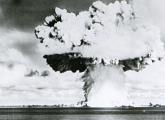
Report: Saudi Arabia in talks to purchase Pakistani nuclear weapons
By JPOST.COM STAFF/05/18/2015
Saudi Arabia has reportedly held talks with Pakistan for the purchase of nuclear weapons amid the ongoing nuclear negotiations between world powers and Iran, according to a US senior official who spoke with The Sunday Times. Tensions in the region have escalated in light of the framework agreement the United States and the other world powers have made with the Islamic Republic, with Saudi Arabia increasingly concerned with the repercussions of a deal that may see the easing of sanctions leaving Iran more legroom to continue developing weapons of mass destruction. The strain in relations was evident when Saudi Arabia’s King Salman skipped a major summit in Washington this week, along with the leaders of three other Gulf nations. “For the Saudis the moment has come,” The Sunday Times quoted a former US defense official as saying. “There has been a long-standing agreement in place with the Pakistanis and the House of Saud has now made the strategic decision to move forward.” Saudi Arabia is skeptical that any final, comprehensive deal with Iran will curb its nuclear ambitions, with the West’s engagement having actually “opened the door to nuclear proliferation,” a military source told The Sunday Times The agreement allows Iran to keep 5,000 uranium enrichment centrifuges at Natanz, and another 1,000 centrifuges at its underground enrichment facility in Fordow. According to one senior British official who also spoke with The Sunday Times, military leadership from all Western countries “assume the Saudis have made the decision to go nuclear.” “The fear is that other Middle Eastern powers — Turkey and Egypt — may feel compelled to do the same and we will see a new, even more dangerous, arms race.”
Iran eyeing full-force return to oil market once nuclear deal passes
REUTERS/05/18/2015/The Organization of the Petroleum Exporting Countries (OPEC) is unlikely to implement a production cut at its next meeting in June, a senior Iranian official said on Monday. Asked if OPEC would cut output at the upcoming June 5 meeting, Iran’s Deputy Oil Minister Rokneddin Javadi told Reuters: “I don’t think so.” Iran, along with Venezuela, has repeatedly called for OPEC to cut output to shore up low prices that have eaten into producers’ oil revenues. Javadi’s comments signal an admission that the group was unlikely to agree to a reduction, especially after its current strategy has succeeded in curbing non-OPEC output and allowed OPEC to regain market share. OPEC, led by oil kingpin Saudi Arabia, decided at a meeting in November to maintain output and keep global markets amply supplied so that low prices would force high-cost U.S. shale oil producers to cut production first. Javadi indicated later that Iran is still likely in June to push for output reduction or cooperation on the right amount of oil to be delivered to the market.
The meeting could “reinforce cooperation between the members because OPEC is an organization that could make policies for oil price orientation,” Javadi told reporters on the sidelines of the Asian Oil and Gas conference in Kuala Lumpur.
EXPORT LEVELS AFTER SANCTIONS LIFTED
Iran hopes its crude oil exports will return to pre-sanctions levels within three months once a deal with major powers to lift an oil embargo is finalized, he said. “We hope we can come back to the export levels that we had before the sanctions,” Javadi, who is also the managing director of the National Iranian Oil Company, told Reuters. “Yes, 2.5 (million barrels per day), around,” he said, adding that this could possibly be achieved in three to six months. A recent framework deal on Iran’s disputed nuclear program between Tehran and world powers could see sanctions on Iran eventually lifted if a more permanent pact is finalized by a June deadline. The sanctions have more than halved Iranian oil exports since 2012 to about 1 million bpd, mainly to Asia. Iran currently has less than 10 million barrels of crude stored onboard tankers that could be released post-sanctions depending on market conditions, Javadi said. He said the OPEC producer expected to claw back lost market share in Asia and Europe. “It depends on market situation and price level, but we will come back to the traditional trade that we had before,” he said, adding that Asia could take more than 50 percent of Iran’s exports. Global oil prices touched 2015 highs in early May, but are currently only around half the peaks of June 2014, before a worldwide supply glut and a decision by the Organization of Petroleum Exporting countries to maintain output sent crude markets tumbling. Discussions on OPEC making room for the return of Iranian oil would depend on whether sanctions were lifted, he said. Iran says that an increase of its oil production will not cause a price crash. It expects other OPEC members to make way for extra barrels, but so far there is no sign that other OPEC members are willing to cut supply. Iran plans to hold a conference in London in September to attract investors for its exploration and production sector, Javadi said. Javadi said he expected the oil price to rise to around $80 a barrel by the end of 2016. “From a commercial point of view, today’s prices should be sustained and increase gradually,” he said on the sidelines of the Asia Oil and Gas Conference in Kuala Lumpur. “But it depends on the political situation and what’s going on in the Middle East and Arabian countries.”
















